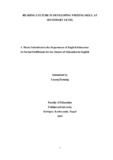Please use this identifier to cite or link to this item:
https://elibrary.tucl.edu.np/handle/123456789/3174| Title: | Reading Culture in Developing Writing Skill at Secondary Level |
| Authors: | Tamang, Lasang |
| Keywords: | Reading;Culture;Writting skills |
| Issue Date: | 2019 |
| Publisher: | Central Department of Education English |
| Abstract: | The present study entitled Reading Culture in Developing Writing Skill at Secondary level main aimed explore how far the reading culture helps to enhance proficiency in writing in English at secondary level and to investigate the perceptions of teachers towards the reading culture to enhance proficiency in writing in English. In order to achieve this objectives, the study was conducted using mixed method. The sampling of this study was secondary level students of 5 different schools of Kathmandu. I completed the research taking 75 samples. The samples were selected on non-random basis. Similarly, 5 English teachers at least one from of each 5 schools in Kathmandu district were the population of the study. Questionnaire and interview were the tools used to collect the data for this study. As the study submitted both the qualitative and quantitative data to analyse. There would be analysed data with help of percentage. The findings of this study showed that reading culture help to develop writing skill. Reading culture is useful in developing writing skill. While students are engaged different reading activities they give high performance in writing skills. The students are engaged in different reading activities as a result, they develop their language learning proficiency. The teacher motivated students in reading different types of non-fiction genres. Especially my research associated with reading culture that help to develop writing skills of the students in different aspects such as correct use of punctuations, appropriate selection lexis, appropriate organization of cohesion, coherence etc. It was found that the students are encouraged reading different fiction and non-fiction to develop writing skill. The thesis consists of five chapters. The chapter, one includes the introduction. Which consists of background of the study, statements of the problems, objectives of the study, research questions, significance of the study, delimitations of the study and operational definitions of the key terms. Similarly, chapter two incorporates the theoretical review of related literature, imperial literature, implication of the study and conceptual framework. Similarly, chapter three presents design and methods, population sample and sampling strategy, data collection tools and techniques, source of data, data collection procedures, data analysis and interpretation procedures and ethical considerations of the study. In the same way, chapter four incorporates analysis and interpretation of the data from questionnaires, analysis and interpretation of the data from interview. Finally, chapter five contains findings of the study, conclusions and recommendations related to policy, practice and further research. References and appendices included in the last part of the thesis presented to made the research valid. |
| URI: | http://elibrary.tucl.edu.np/handle/123456789/3174 |
| Appears in Collections: | English |
Files in This Item:
| File | Description | Size | Format | |
|---|---|---|---|---|
| Cover Page(5).pdf | 29.51 kB | Adobe PDF |  View/Open |
Items in DSpace are protected by copyright, with all rights reserved, unless otherwise indicated.
